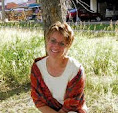Cause and effect
In addition to learning about the animal and its habitat, we are taken along on a true life adventure as wildlife biologist/conservationist, George Schaller studies and strives to protect the chiru. But protecting the chiru is no easy task. He thinks that if he can determine where the calving grounds are, he will be able to petition the Chinese government to protect the area from hunters and, protect the shrinking chiru population. But the shear ruggedness and extreme weather make this a difficult task. Four other men, Conrad Anker, Rick Ridgeway, Galen Rowell and Jimmy Chan, take up Schaller’s mission and after incredible hardship, pulling all their supplies in heavily laden, two-wheeled carts through rough terrain do discover this secret location. (Check out this video clip to see what the carts looked like and some of the conditions the four men had to endure.)
So why are the chiru almost endangered? Namely, for shahtoosh, shawls made from the warmest and finest wool in the world that can only be collected from a dead chiru. They can't be sheared like sheep because without their coats the extreme cold would kill them, and they do not survive in captivity. Apparently, the highly prized shawls (sold for thousands of dollars) are the equivalent of three to five dead chiru (p. 18). This is another example of consumers in the West are driving illegal activities that are determental to animal populations.
The illustrations are beautifully rendered with an emphasis on cool colours that are evocative of the high altitude of Tibet’s plateaus. There are two pages of photographs that give us a glimpse of the landscape and what a chiru looks like, and a short bibliography at the back of the book.
This will be a great book to bring into elementary classrooms to illustrate effects of globalization, the impact humans can have on animal populations, consumerism, and illegal trafficking of animal parts, in addition to learning about a unique animal in an exotic place.
Today is Nonfiction Monday. Pop by A Curious Thing to see other blogs reviewing nonfiction children's literature.















1 comments:
Oh wow, all these things are unfamiliar to me - i felt like I've grown a hundredfold smarter just by reading your post! Haha. Will definitely check out this book. Thanks for sharing this!
Post a Comment